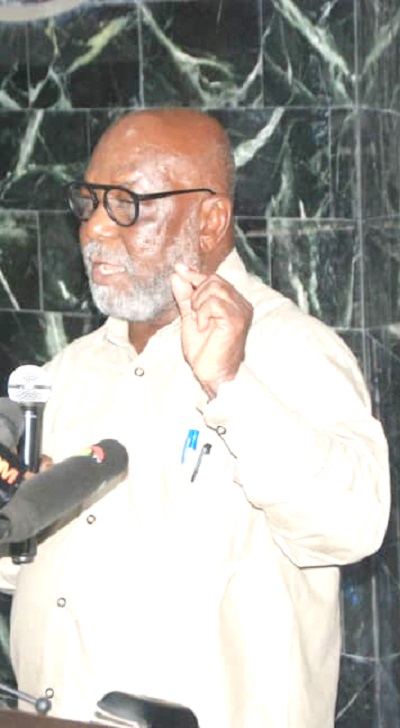THE Dean of the School of Communications Studies at the Winsconsin International University College, Professor Kwame Karikari, has identified the threat of false news as one of the challenges of the new technologies for mass media communication and, therefore, called on the traditional media to help authenticate and counter it.
In so doing, he called for a higher sense of professionalism on the part of traditional media journalists to safeguard the integrity of journalism.
GJA lecture
Prof. Karikari, who is also the Chairman of the Board of the Graphic Communications Group Ltd, was speaking at a public lecture organised by the Ghana Journalists Association (GJA) in Accra yesterday as part of a series of lectures lined up by the GJA to mark its 70th anniversary.
It was on the topic: “Journalism yesterday and today: Repositioning media with technology.”
The occasion, which was chaired by Ms Elizabeth Ohene, a former Minister of State and a columnist of the Daily Graphic, a paper she once edited, attracted a number of veteran journalists and members of the academia.
Prof. Karikari stressed the need for journalists in the traditional media to ensure that these new technologies were made more positive for the news in mass communication.
“In all of this, one of the concerns is our technological dependency as a people. It is very difficult to chase the new technologies because they are changing at a dizzying rate of progress and we have to chase them.
“Right now, we are saddled with the project of digital migration which needs all our interest and attention because it appears that the industry people are not happy with the way the Ministry of Communications is approaching the whole process,” Prof. Karikari added.
He said it was important that all paid attention and should not allow the country’s electronic broadcasting — that is radio and television — to be taken over by foreign investors.
History of the press
Recounting the history of the press in Ghana from the emergence of the newspapers, the political party press through to radio, television, magazines and journals, Prof. Karikari said there had been some progress in journalism in modern times.
However, he said : “We can testify through the number of radio stations whose professionalism can equal the best anywhere in the world.
On television, he said, there had been new efforts to produce new formats, documentaries and investigative journalism but lamented about the seeming neglect of community radio stations in the country.
The academician and freedom of expression advocate indicated that the community radio faced critical challenges of survival, citing huge electricity bills as one of the major threats to the existence of such radio stations.
“If one day the electricity producers decide to cut off power to the radio stations, most radio stations will not exist,” he stated.
Chairperson
Ms Ohene, said content was critical in the journalism practice and called on journalists not to allow technology to dictate the pace.
The President of the GJA, Mr Roland Affail Monney, for his part, expressed the hope that the killers of Ahmed Suale, an investigative journalist, would be apprehended adding that the circumstances surrounding his death had eroded the country as the reference point in journalism.

